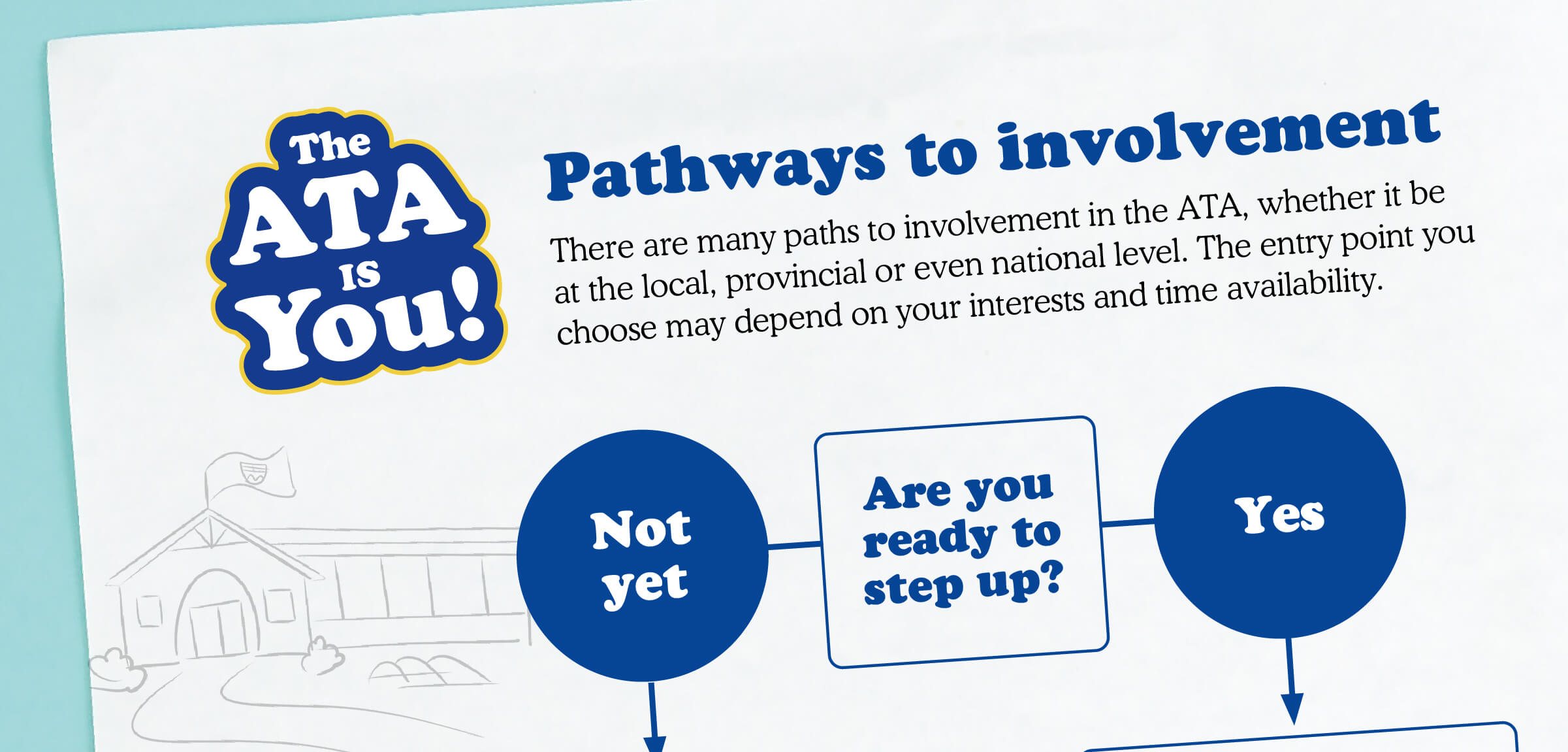The ATA is You
There are many paths to involvement in the ATA, whether it be at the local, provincial or even national level. The entry point you choose may depend on your interests and time availability.
Are you ready to get involved?
- Not Yet
- That's okay. Continue to stay engaged with your professional association by signing up for a specialist council, members’ updates, the ATA eNews and ATA eMagazine.
- Yes
- Proceed to the next question
Which level interests you?
- Local
- School representative. Volunteer at your school.
- Local executive member, committee member, PD chair, ARA delegate. Attend a local meeting and learn how to serve in these and other roles.
- Teachers’ convention. Volunteer with your area’s convention association.
- Provincial
- Professional Development corps. Apply to serve as an Association instructor/facilitator.
- Specialist council. Consider volunteering for a role on the council’s executive.
- Committee. Apply to serve on an ATA committee.
- Provincial Executive Council. Run for election to the ATA’s governing body: Provincial Executive Council (PEC)
- National
- Advisory committees. Apply to serve on one of several of the Canadian Teachers’ Federation.
Volunteer Locally
There are 55 locals in the province that offer a wealth of volunteer roles ranging from politically active to behind the scenes.
Many teachers who are involved in the Alberta Teachers’ Association got their start by attending a meeting of their ATA local.
School representative
- The school representative (school rep) acts as a conduit between teachers and the ATA. They receive and gather information from the ATA and their local and bring it to the attention of teachers in their school. When teachers approach them with questions or concerns, the school rep directs them to the appropriate expertise in the local or at Barnett House or SARO.
- School rep is a common entry role for teachers who are first volunteering in their local.
Local communications officer
- Looks after the various communications functions that a local might undertake, such as a newsletter, website, social media, media relations, advertising and event management.
- This role is another common entry point for teachers new to ATA work.
- The ATA provides a significant amount of training for members in this role.
Local political engagement officer
- Keeps local members engaged in political events and issues by staying aware of political goings on, communicating these with members, organizing ways to bring members together with elected officials, engaging in campaigns to make members aware of candidates and issues, and encouraging members to participate in political activities and vote.
Local executive
- ATA locals typically have the following positions:
- president
- vice-president
- past president
- secretary
- treasurer
- It’s common for members to work up to executive positions by first serving in other roles, but some are elected directly to the executive as their first volunteer role.
- Most local council meetings are open and welcoming, allowing any member to observe and find out more about the local and its activities.
Start where you are. Use what you have. Do what you can.
Arthur Ashe
Professional Development Committee
- Organizes professional development activities within the local.
- This is a good option for new teachers, as there is often room for new members.
- This committee is less political than some of the other positions.
Teacher Board Advisory Committee
- Enables the local to have conversations with the school board about issues that are unrelated to bargaining.
- In some locals, this committee is populated only by members of the executive; others include members elected at large.
Teacher Welfare Committee
- Oversees the negotiation of local collective agreements.
- Acts as liaison between the ATA’s collective bargaining officials and local teachers.
Political Engagement Committee
- Supports the activities of the political engagement officer
Communications Committee
- Supports the activities of the local communications officer
Other committees
- Diversity, Equity and Human Rights
- Women In Leadership
- Substitute Teachers
- Administration
- Service to Members
- Teachers Convention Committee
Annual Representative Assembly delegate
- The Association holds its Annual Representative Assembly (equivalent to an annual general meeting) each May long weekend. The weekend’s agenda includes debate and voting on the ATA’s budget and policies.
- Each ATA local sends a specific number of delegates to ARA and has its own mechanism for choosing its delegation. If this opportunity is of interest to you, check with your local.
Explore local volunteer opportunities
Volunteer Provincially
At the provincial ATA, there are many ways that teachers throughout the province can volunteer.
Professional Development corps
- Association instructors facilitate a variety of workshops for school- and district-based professional development events, teachers’ conventions and specialist council conferences.
- Each year, participants attend two training sessions and deliver 7 to 10 workshops.
- Applications are taken periodically throughout the year and are advertised in the ATA News.
Indigenous facilitators
- Indigenous Education PD facilitators coach members on Indigenous-focused competencies and present Walking Together: Education for Reconciliation workshops.
- Facilitators also develop relationships with Indigenous Elders, Knowledge Keepers and Cultural Advisors; honour cultural protocols; and share Indigenous expertise.
Specialist councils
- The ATA has 20 specialist councils.Each focuses on a specific subject area and organizes annual conferences, workshops, webinars and other opportunities to help teachers and school leaders meet their professional development goals.
Learn more about Specialist Councils
Committees
- The ATA operates a variety of standing committees composed of volunteer field members that each advise Provincial Executive Council on a specific area of focus. Committee openings are posted on the ATA website each February and throughout the year on occasion.
Provincial Executive Council
- Provincial Executive Council (PEC) is an executive committee that is responsible for directing the business of the Association. Included on council are 18 elected positions that are open to any ATA member in good standing:
- ATA president (1)
- ATA vice-president (2)
- District representative (15)
- Rounding out Council are the past president and ATA executive secretary.
- PEC general elections take place every two years.
PEC members
- are teachers;
- meet at least eight times each year;
- serve on internal and external committees and Association subgroups, like specialist councils;
- engage in professional development as part of their duties;
- make decisions affecting the ATA’s budget, policies and strategic direction; and
- are accountable to the ATA membership.
Explore Provincial Volunteer Opportunities
Volunteer Nationally
Canadian Teachers’ Federation (CTF)/Fédération canadienne des enseignantes et des enseignants (FCE)
advisory committees
- Advisory committees of the CTF/FCE are made up of teachers from across the country and provide an opportunity for Alberta teachers to represent the ATA at the national level. Each year, the Association is eligible to submit nominations for these committees.
- The CTF’s advisory committees cover a variety of areas:
- Diversity and human rights
- French as a first language
- Indigenous Education
- The status of women
- The teaching profession
Did you know?
First committees
Started in 1918, the ATA’s first committees were the Curriculum Committee and the Legal Committee. The Curriculum Committee is still operating today.
Convention season
Teachers’ conventions are organized by volunteer teachers just like you. The ATA took over the delivery of teachers’ conventions from the provincial department of education in 1942.



